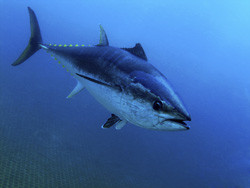Population genetics of bluefin tuna
Atlantic bluefin tuna (ABFT) — Thunnus thynnus — is a massively overfished species that requires careful stock management to avoid extinction. To protect this species, better knowledge and understanding of its population structure is needed. The EU-funded ABFT SNP project aimed to develop genetic resources for ABFT. Researchers specifically wanted to identify a suite of variations in the DNA code that could be used to investigate population variability. They sequenced the transcriptome (RNA molecules that code for proteins as well as other non-coding RNAs) of a large number of tuna. This revealed substantial genetic variation in bluefin tuna populations. Sequence data was also combined with prior knowledge of the ABFT genome to identify 128 locations of DNA variation relevant to population variability. These were used to design an OpenArray genotyping chip that will allow users to easily differentiate between ABFT population groups. Researchers furthermore produced marker panels for specific genes, and identified other useful types of DNA variations such as single sequence repeats. Overall, ABFT SNP furthered the genetic characterisation of ABFT and provided tools for in-depth study of population genetics in this species.







